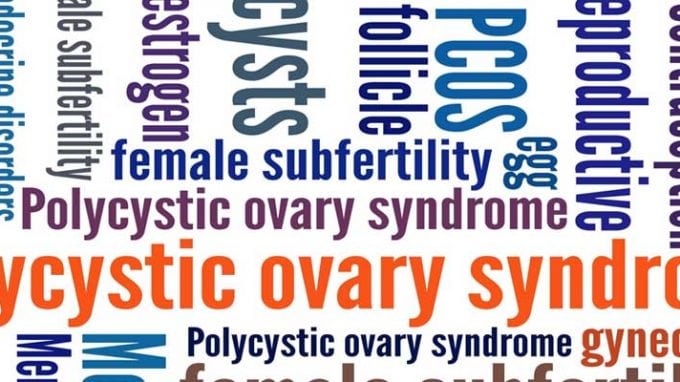Polycystic ovary syndrome (PCOS) is a hormone imbalance that affects many women, and it cause people to sweat excessively without any cause.
If you find yourself sweating a lot, it might be a sign that you are having some sort of health problem. Extreme sweatiness, which is medically referred to as hyperhidrosis, often happens when the hormones that control metabolism, blood pressure and body temperature stop working correctly. Since polycystic ovary syndrome is caused by hormonal imbalances, it is no surprise that sweating is one of the most common symptoms of this health problem.
What Is Polycystic Ovary Syndrome?
Polycystic ovary syndrome is a term used to refer to consistent imbalances within the endocrine system. The endocrine system is many different glands that are supposed to regulate metabolism, mood, growth, sexual characteristics, reproduction and sleep. There are many different types of endocrine disorders, but polycystic ovary syndrome is characterized by ovaries that are enlarged and covered with cysts. A lot of strange things can happen due to these imbalanced hormones, but they generally tend to cause elevated levels of male hormones in women.
What Are the Symptoms of PCOS Induced Sweating?

Are There Any Other Symptoms of Polycystic Ovary Syndrome?
Even if you have the characteristic hyperhidrosis associated with polycystic ovary syndrome, you probably do not have the condition unless you are dealing with other common symptoms of this hormonal imbalance. Women with polycystic ovary syndrome tend to have a lot of thick, dark body hair, especially on the face, and many are often overweight due to hormone imbalances. The excessive androgen and lack of estrogen can cause irregular periods that last very long or do not occur for several months. The combination of irregular menstruation and ovary cysts may cause fertility issues. If you have excessive sweating and any of these other symptoms, you should talk to your doctor about the possibility of you having polycystic ovary syndrome.
Why Does Polycystic Ovary Syndrome Cause Sweating?
Extreme sweating is an extremely common symptoms of polycystic ovary syndrome because the hormone imbalances affect metabolism and stress. The hypothalamus releases hormones that induce sweating if the body gets too hot. When women have polycystic ovary syndrome, the hypothalamus can get confused and start sending out signals that the body is too hot and should produce sweat even if the temperature is balanced. In addition to sweating more because your metabolism and body temperature is out of balance, you may be sweating because you have elevated cortisol levels. High cortisol levels induce feelings of anxiety that can cause women with polycystic ovary syndrome to have nervous sweating.
How Can You Deal With Hyperhidrosis?
Excessive sweating can make women feel embarrassed and prevent them from functioning normally throughout the day. Fortunately, there are a few methods of dealing with extreme sweating if it is caused by polycystic ovary syndrome. If you are suffering from this problem, you can talk to your doctor about getting a prescription strength antiperspirant that is stronger than normal store bought items. Staying in extremely chilly, dry environments can also help to prevent the involuntary sweating reaction. Stress management techniques such as meditation have also shown some promise at lowering sweat levels. If you do have polycystic ovary syndrome, you will most likely undergo treatment plans designed to balance hormone levels in the endocrine system. Finding a treatment for polycystic ovary syndrome that works for you can help to calm your hormones and prevent the excessive sweating.





